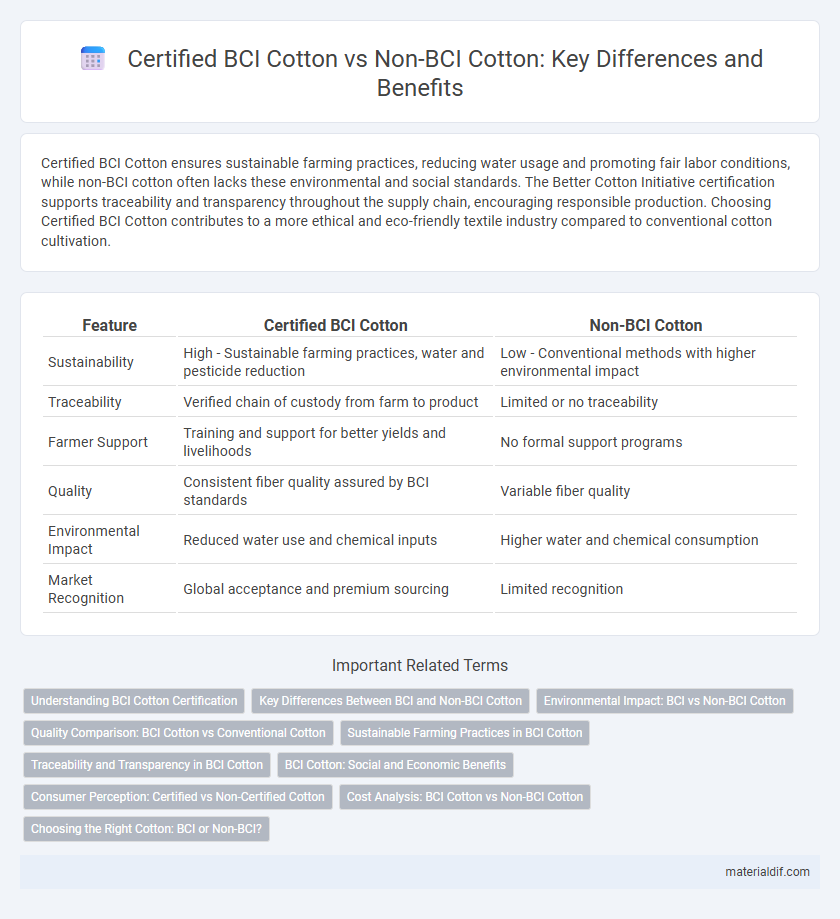Certified BCI Cotton ensures sustainable farming practices, reducing water usage and promoting fair labor conditions, while non-BCI cotton often lacks these environmental and social standards. The Better Cotton Initiative certification supports traceability and transparency throughout the supply chain, encouraging responsible production. Choosing Certified BCI Cotton contributes to a more ethical and eco-friendly textile industry compared to conventional cotton cultivation.
Table of Comparison
| Feature | Certified BCI Cotton | Non-BCI Cotton |
|---|---|---|
| Sustainability | High - Sustainable farming practices, water and pesticide reduction | Low - Conventional methods with higher environmental impact |
| Traceability | Verified chain of custody from farm to product | Limited or no traceability |
| Farmer Support | Training and support for better yields and livelihoods | No formal support programs |
| Quality | Consistent fiber quality assured by BCI standards | Variable fiber quality |
| Environmental Impact | Reduced water use and chemical inputs | Higher water and chemical consumption |
| Market Recognition | Global acceptance and premium sourcing | Limited recognition |
Understanding BCI Cotton Certification
BCI Cotton certification ensures sustainable farming practices by prioritizing water efficiency, soil health, and fair labor conditions, distinguishing it from non-BCI cotton which may lack such standards. Farmers participating in the Better Cotton Initiative (BCI) undergo rigorous training and adhere to criteria that reduce environmental impact and improve social outcomes. This certification supports a globally recognized framework aimed at transforming cotton production into a more responsible industry.
Key Differences Between BCI and Non-BCI Cotton
Certified BCI Cotton is produced under the Better Cotton Initiative, which emphasizes sustainable farming practices, reduced water usage, and improved labor conditions, distinguishing it from Non-BCI Cotton that often lacks these verified standards. BCI certification ensures traceability and environmental responsibility, whereas Non-BCI Cotton may involve conventional methods with higher chemical inputs and less stringent social accountability. The key differences include sustainability metrics, farmer training programs, and overall impact on ecosystem health.
Environmental Impact: BCI vs Non-BCI Cotton
Certified BCI cotton significantly reduces water consumption and pesticide use compared to non-BCI cotton, promoting sustainable farming practices that protect soil health and biodiversity. BCI cotton farmers adopt efficient irrigation techniques and integrated pest management, leading to lower environmental footprints and reduced greenhouse gas emissions. Non-BCI cotton production often relies on conventional farming methods with higher chemical inputs and water usage, resulting in greater ecosystem degradation and resource depletion.
Quality Comparison: BCI Cotton vs Conventional Cotton
Certified BCI Cotton ensures higher fiber quality by adhering to sustainable farming practices that reduce chemical use, resulting in stronger, longer fibers compared to conventional cotton. This improved fiber integrity leads to better durability, softness, and uniformity in textiles made from BCI Cotton. Conventional cotton often contains shorter, weaker fibers due to less controlled agricultural methods, impacting the overall fabric quality and lifespan.
Sustainable Farming Practices in BCI Cotton
Certified BCI Cotton is produced under the Better Cotton Initiative, which promotes sustainable farming practices such as water efficiency, soil health improvement, and reduced pesticide use. Non-BCI Cotton often lacks these standardized sustainability measures, leading to higher environmental impacts and resource depletion. Emphasizing sustainable farming, BCI Cotton supports biodiversity conservation and farmer livelihoods while minimizing ecological footprints.
Traceability and Transparency in BCI Cotton
Certified BCI Cotton is distinguished by its robust traceability and transparency throughout the supply chain, enabling retailers and consumers to verify sustainable farming practices and fair labor conditions. BCI standards require detailed documentation and third-party audits, ensuring accountability from farm to finished product. In contrast, non-BCI cotton typically lacks standardized traceability mechanisms, making it challenging to confirm the cotton's sustainability credentials or origin.
BCI Cotton: Social and Economic Benefits
BCI Cotton, produced under the Better Cotton Initiative, significantly improves social and economic conditions for farmers by promoting sustainable farming practices and fair labor standards. This certification enhances income stability through higher yields and better market access while supporting community development projects. In contrast, Non-BCI Cotton often lacks these systemic benefits, leading to inconsistent quality and limited socio-economic progress for growers.
Consumer Perception: Certified vs Non-Certified Cotton
Consumers increasingly favor Certified BCI Cotton due to its assurance of sustainable farming practices, reduced environmental impact, and improved labor conditions. Non-BCI Cotton lacks standardized certifications, leading to consumer skepticism about ethical sourcing and quality consistency. Market trends reveal higher willingness to pay premiums for Certified BCI Cotton, reflecting stronger brand trust and ethical consumerism.
Cost Analysis: BCI Cotton vs Non-BCI Cotton
Certified BCI Cotton often incurs higher upfront costs due to rigorous sustainability standards and certification fees, yet it can lead to long-term savings through improved soil health and water efficiency. Non-BCI Cotton typically has lower initial expenses but may result in higher environmental and social costs, which can impact supply chain stability and brand reputation. Evaluating total cost of ownership, including environmental impact and market demand for sustainable products, is essential for accurate cost analysis between BCI and non-BCI cotton.
Choosing the Right Cotton: BCI or Non-BCI?
Choosing the right cotton involves comparing Certified BCI cotton with non-BCI cotton, where BCI (Better Cotton Initiative) cotton emphasizes sustainable farming practices, water efficiency, and reduced pesticide use, benefiting both the environment and farming communities. Non-BCI cotton typically lacks these certifications and may involve conventional methods with higher environmental and social impacts. Opting for BCI cotton supports ethical sourcing, improved farmer livelihoods, and contributes to eco-friendly textile production.
Certified BCI Cotton vs Non-BCI Cotton Infographic

 materialdif.com
materialdif.com